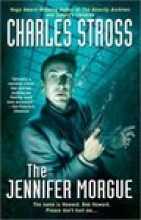Stross has car
ved out a funny little niche, and he OWNS it. If there's anyone else out there who is writing fiction where Lovecraft's mythos is real, and its threat is constantly being mitigated by a CIA-like government agency, I'm not aware of it. (Neil Gaiman's "Study in Emerald" comes to mind, but as a stand-alone short story that isn't set in the present day, it doesn't really count.)
The Jennifer Morgue returns to the world Stross first described in "The Atrocity Archives." Collectively these are called "the Laundry Files novels," which Wikipedia describes as "Lovecraftian spy thrillers involving a secret history of the 20th century." A dry description, but perfectly accurate.
The Laundry Files novels star Bob, an IT guy for The Laundry, which is a CIA-like British spy agency. (MI-6-Like would probably be more apt, but that's just too many hyphens for my taste.) The Laundry deals with diplomatic relations between our world and that of Lovecraft's Old Ones, as well as handling any unusual incursions which may happen.
Bob is an unlikely hero, an "everyman" who somehow gets suckered into the oddest roles. The Jennifer Morgue has Bob being sent to handle a Situation along with an incredibly beautiful woman. Except that she isn't actually beautiful, and isn't actually human, either. She's a member of another agency which is working with The Laundry to… well, to prevent the end of the world, of course!
I like Stross' Laundry Files a lot, which is somewhat puzzling to me, because I can't make heads or tails of his hard sci fi books. I've tried several of them, and they just don't work for me on any level. I've never had such a strong split reaction to an author's body of work, but there you have it.
If you like Stross' hard sci fi novels, you may not care for these. But if you've tried his hard sci fi and it hasn't turned your crank, then you should definitely give one of the Laundry Files stories a try.
The Jennifer Morgue's basic story is thus: a secret Soviet submarine lies on the bottom of the ocean. It contains a device that allows the user to talk to the dead. Problem being, the submarine lies in "enemy territory," as mapped out by an ancient treaty between humanity and the Great Old Ones.
I'm on the fence about the Big Reveal that comes about 2/3rds of the way to the end. On the one hand it's clever and fun, and it takes the story in an interesting direction. On the other hand I think it could have been invoked a lot sooner in the narrative, because it seemed a little bit "bolted on at the end out of authorial desperation."
At any rate, this is a fun read, and it toys with the worlds of spy thrillers and Lovecraft in a surprisingly light-hearted and entertaining way.
A note on the audiobook version: According to Wikipedia, the book makes heavy use of footnotes. Obviously that's all lost in the audiobook version. I'm not sure if that was conveyed well. I think it might have turned out a little bit confusingly.
The narrator did an excellent job, although I was initially perplexed by the word he pronounces as "geese." I assume this is "
geas" but I'm not entirely sure.







